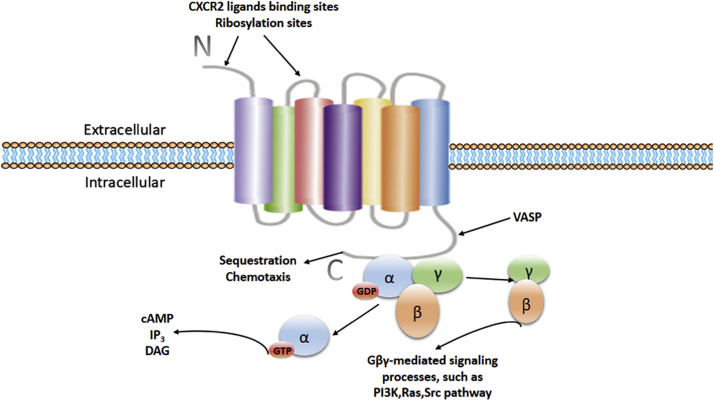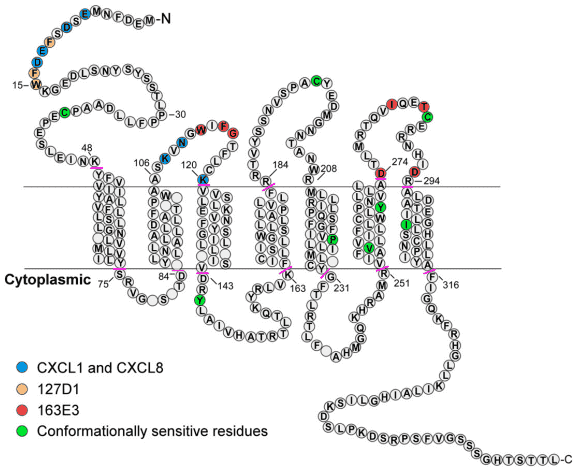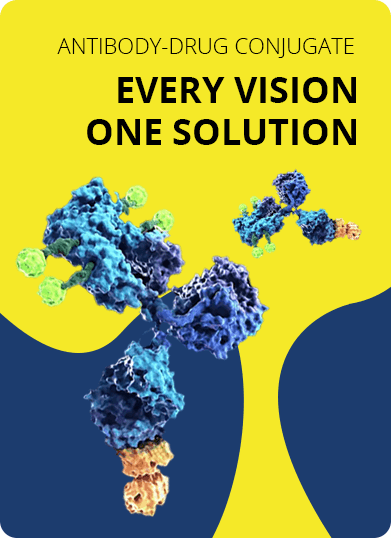- Home
- UTC Development
- Bispecific ADC Development
- Biparatopic Receptor based Bispecific ADC Development
- Biparatopic CXCR2-targeted Bispecific ADC Development
Biparatopic CXCR2-targeted Bispecific ADC Development Service
Antibody-drug conjugates (ADC) and bispecific antibody (bsAb) are displaying obvious promise and potence in cancer therapy, and their combination termed as bispecific ADCs presently shows more powerful performance during cancer treatment and are developed actively.
Creative Biolabs’ antibody development and bioconjugation team has successfully prepared multiple antibody-drug conjugates and is led by experienced industry professionals with demonstrated expertise in bioconjugations from milligram R&D scale up to multi-gram-scale. We offer the novel bispecific biparatopic ADC for your specific requirements.
Introduction of CXCR2
CXCR2, also known as interleukin 8 receptor beta, is a chemokine receptor encoded by the IL8RB gene. It belongs to the G-protein-coupled receptor family. CXCR2 acts as the receptor of interleukin 8 (IL8), which can bind to IL8 with high affinity, and transduce the signal through a G-protein-activated second messenger system. It also binds to chemokine (C-X-C motif) ligand 1 (CXCL1/MGSA) that is a protein with melanoma growth stimulating activity involved in the serum-dependent melanoma cell growth. Besides, CXCR2 can also bind CXCL2, CXCL3, and CXCL5.
CXCR2 is expressed on immune cells including neutrophils, mast cells, monocytes, and macrophages. It is also expressed on endothelial and epithelial cells and numerous types of tumor cells. This receptor is associated with a variety of disease states such as chronic inflammation, sepsis, lung pathology, atherosclerosis, and neuroinflammation. Inflammation usually represents the major hallmark of cancers and is linked to 15-20% of cancer deaths worldwide. CXCR2 has been found involved in poor outcomes for different cancers through its effects on migration, invasion, and angiogenesis. The CXCLs/CXCR2 axis plays a critical role in the tumor microenvironment and in recruiting neutrophils to inflammatory sites. Over the last several decades, CXCR2 has been used as a target in many therapeutic strategies and showed promising results and entered clinical trials.
 Fig.1 The structure of CXCR2. (Cheng, 2019)
Fig.1 The structure of CXCR2. (Cheng, 2019)
Biparatopic CXCR2-targeted Bispecific Antibody
Bispecific biparatopic antibody has been used in novel ADC development and showed enhanced internalization and trafficking to the lysosome by inducing clustering and cross-linking of receptors. For example, bivalent and biparatopic sdAbs targeting CXCR2 nonoverlapping epitopes have been generated. Studies demonstrated that the biparatopic sdAbs present avid ability to bind CXCR2 receptor molecules. Most importantly, they have superior potency and efficacy compared to their monovalent and bivalent counterparts. Therefore, this type of biparatopic antibody is considered as a potential module in ADCs development for cancer therapy targeting CXCR2.
 Fig.2 Epitope mapping of CXCR2 sdAbs. (Bradley, 2015)
Fig.2 Epitope mapping of CXCR2 sdAbs. (Bradley, 2015)
What Can We Do for You?
Creative Biolabs has enriched experience in bioconjugation, our experts can offer comprehensive ADC preparation and characterization services. Now we provide innovative bispecific biparatopic ADCs development services against CXCR2. Our professional scientist team is available to perform ADC conjugation and purification for maximum performance for your application. Moreover, various methods have been established for the characterization and validation of custom bispecific ADCs.
Our first-class ADC development services include ADC Antibody Screening, DrugLnk™ Custom Synthesis, Antibody Design, and Conjugation to ADC in vitro Analysis and ADC in vivo Analysis. If you are interested in our services, please contact us and we are pleased to offer more detailed information.
References
- Cheng, Y.; et al. Potential roles and targeted therapy of the CXCLs/CXCR2 axis in cancer and inflammatory diseases. Biochimica et Biophysica Acta (BBA)-Reviews on Cancer. 2019.
- Bradley, M. E.; et al. Potent and efficacious inhibition of CXCR2 signaling by biparatopic sdAbs combining two distinct modes of action. Molecular pharmacology. 2015, 87(2): 251-262.
For Research Use Only. NOT FOR CLINICAL USE.

Online Inquiry
Welcome! For price inquiries, please feel free to contact us through the form on the left side. We will get back to you as soon as possible.
